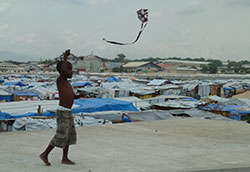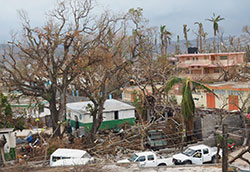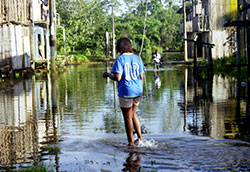Advancing Health Research in Humanitarian Crises
Related Funding
- Invitation to develop case examples of health research in humanitarian contexts
Deadline:
Jan 21, 2019
Financial support:
Up to $5,000 per case - Making the case for health research in humanitarian crises: a call for case examples by Fogarty scientists
Evidence Aid blog, Nov 20, 2018 - NIH supports study of health risks and resilience following Hurricanes Irma and Maria
NIMHD/NIH news, Sep 21, 2018 - Elrha's Research for Health in Humanitarian Crises Programme (R2HC)
Due date: Jul 17, 2018 - Call for evidence on conducting ethical research in global health emergencies from the Nuffield Council on Bioethics
Reply by Aug 17, 2018
Related News
- How can we conduct research in humanitarian crises?
Opinion by Fogarty Director Dr Roger I Glass
Sep/Oct 2017 Global Health Matters
In collaboration with partner NIH Institutes and Centers, other U.S. government agencies, academic researchers from the U.S. and abroad, nongovernmental organizations and key international organizations, the Fogarty Center for Global Health Studies (CGHS) is leading a project to engage researchers, humanitarian organizations and policymakers to share learning and strategies on conducting health research in the context of humanitarian crises in low- and middle-income countries (LMICs).
The project seeks to:
- catalyze timely, high-quality, ethical and actionable research in humanitarian crises; and
- encourage uptake of evidence into the policy and practice of organizations that respond to humanitarian crises.
The project brings together experts and practitioners across disciplines, disease areas and geographies from research, humanitarian and policymaking communities, including representatives from LMICs, and builds on the work of partner organizations, such as theNIH Disaster Research Response (DR2) program and Elrha's Research for Health in Humanitarian Crises (R2HC) .

Photo courtesy of CDC, CC BY 2.0

Photo by Coralie Giese, CDC, CC BY 2.0

Photo courtesy of Dr. Karen Levy
Context
Natural disasters affect nearly 160 million people each year, more than 65 million people are currently displaced from their homes, and biological disasters and armed conflict claim the lives of millions more worldwide, with a disproportionate effect on people living in LMICs. These crises cause severe health issues and disrupt access to health care, food, water, sanitation, medicine and security.
Conducting health research in these settings is very difficult and currently there is a limited amount of scientific evidence that can inform humanitarian responses. High-priority research can help us to understand the short- and long-term impact of these crises on health and inform governments, development agencies and humanitarian organizations on how best to respond to situations ranging from acute emergencies to protracted refugee crises.
In addition to the benefits for the global health and humanitarian communities, this area of much-needed research has significant benefits for the U.S. Evidence-based health interventions improve the government’s ability to respond to disasters in the U.S. and can help prevent the spread of infectious diseases across borders, resulting in better health outcomes for Americans.
Workshop
As a part of the project, a small workshop was held at NIH April 9-11, 2018 with key research and humanitarian stakeholders from diverse disciplines, areas of expertise and geographic regions. Some of the key highlights from the meeting are:
- To mitigate the challenges of humanitarian settings, researchers should be flexible, adapt methodologies to the context, and utilize relevant tools and technologies.
- Implementation science is an underutilized tool in humanitarian settings, which can significantly improve the adoption, adaptation and scale-up of interventions.
- Humanitarian researchers need to effectively engage with communities and affected populations to build trust and ensure that findings benefit those in need.
- Researchers working in humanitarian crises need specialized skills and capacities, interpersonal abilities, and the ability to adapt to rapidly changing environments.
- Partnerships are essential to humanitarian health research, and may involve local communities, local governments, nongovernmental organizations, UN agencies and military personnel, among others.
- There are many unique ethical questions related to working with populations affected by crises, such as balancing urgent needs with important research questions that may improve future humanitarian responses.
Planning Committee
- Iman Nuwayhid, American University of Beirut, Co-Chair
- Brandon Kohrt, George Washington University, Co-Chair
- Rima Afifi, University of Iowa
- Grace Akello, Gulu University, Uganda
- Andrea Beckel-Mitchener, National Institute of Mental Health (NIMH)/NIH
- Ananda Galappatti, The Good Practice Group, Sri Lanka
- Rita Giacaman, Birzeit University, Birzeit, West Bank
- Anne Harmer, Research for Health in Humanitarian Crises (R2HC)
- Rebecca Henry, National Institute of Nursing Research (NINR)/NIH
- Naoko Kozuki, International Rescue Committee (IRC)
- Vesna Kutlesic, Eunice Kennedy Shriver National Institute of Child Health and Human Development (NICHD)/NIH
- Adam Levine, Brown University
- Aubrey Miller, National Institute of Environmental Health Sciences (NIEHS)/NIH
- Bayard Roberts, London School of Hygiene and Tropical Medicine
- Barbara Sina, Fogarty International Center (FIC)/NIH
- Robert Sorenson, National Institute of Allergy and Infectious Diseases (NIAID)/NIH
- Paul Spiegel, Johns Hopkins University
- Carrie Teicher, Médecins Sans Frontières (MSF)/Epicentre
Inquiries
Amit Mistry, Ph.D.
Senior Scientist (Contractor)
Center for Global Health Studies
Fogarty Division of International Science Policy, Planning and Evaluation
Email: amit.mistry@nih.govBlythe Beecroft, M.S.
Global Health Research and Policy Analyst (Contractor)
Center for Global Health Studies
Fogarty Division of International Science Policy, Planning and Evaluation
Email: blythe.beecroft@nih.gov
Updated November 16, 2018





















.png)









No hay comentarios:
Publicar un comentario